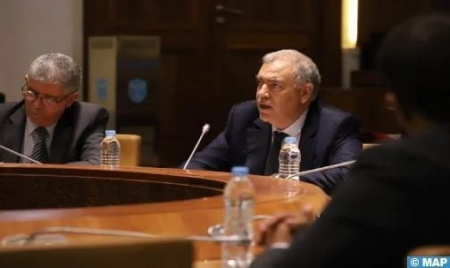Ministry of Interior Continues to Implement Strategies Strengthening Security Services – Interior Minister –
– The Ministry of the Interior continues to implement various strategies and plans to strengthen the security services and modernize their working methods, with the aim of promoting the security services and their role in preserving public order, Interior Minister Abdelouafi Laftit said Thursday in Rabat. Presenting his department’s draft budget for 2024 to the House of Representatives’ Internal affairs, communes, Housing and Urban Policy Committee, Laftit noted that the ministry had also ensured to apply the principles of security governance, in order to strengthen the management and intervention capacities of this essential service and achieve optimum efficiency. In terms of security and maintaining public order, the Ministry has worked to reinforce security vigilance and apply preventive approaches to combat crime in all its forms, deal with the potential risks of active terrorist networks, and combat money laundering and the financing of terrorism, “which continue to constitute a permanent threat to the country’s security and stability,” he stressed. At the same time, said Laftit, operations to combat criminal networks specializing in drug trafficking, irregular migration, and human trafficking continued. Close coordination between the various departments involved has led to the dismantling of many of these networks, the foiling of numerous criminal projects, and the neutralization of terrorist cells and operations, the Minister underlined. Referring to the modernization projects in the security field, Laftit noted that the year 2023 saw the continued development of the information and communication infrastructures of the National Security services, through the implementation of numerous projects in support of technological evolution and the development of information networks, adding that these efforts have a positive impact on the action of the security services and consolidate the feeling of security and tranquility among citizens. On the subject of prevention and civil protection, Laftit said that his department supports the capacities and resources of the General Directorate of Civil Protection, to continue strengthening territorial coverage in terms of intervention and first aid, and to build new rescue centers to cover risks, in line with the requirements of regional distribution. He went on to say that the Ministry had also worked to equip the services with the means and equipment needed for field interventions, as well as operational and logistical resources. These efforts, he said, enabled the service to play a major role in the aftermath of the Al Haouz earthquake, alongside the Royal Armed Forces, the Royal Gendarmerie, National Security, Auxiliary Forces, and ministerial departments, in terms of rescue, assistance, and care for victims. Laftit also pointed out that the Ministry, in implementation of the High Instructions of His Majesty King Mohammed VI concerning assistance to stricken families and the acceleration of the rehabilitation and reconstruction of areas affected by the earthquake, has taken concrete steps to facilitate the work on the ground of the teams responsible for identifying victims, in order to guarantee the conditions necessary for the allocation of financial aid to families with the speed and precision required. Despite the efforts made, the challenges of natural disaster management now weigh heavily on public policies, particularly in the field of risk and crisis management, he noted. These challenges call into question the sustainability, prospects, and weaknesses of these policies, as well as their efficiency in implementing effective and coherent intervention and rescue strategies and plans, Laftit concluded.

